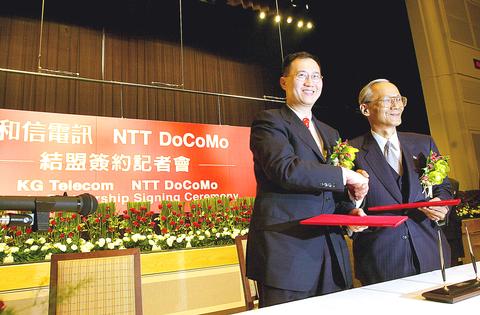Two weeks of speculation ended yesterday when KG Telecom (和信電訊) signed a strategic partnership with NTT DoCoMo to provide 3G mobile Internet services similar to Japan's popular i-mode to Taiwanese consumers. The companies also left open the option of a China market alliance.
NTT DoCoMo, Japan's largest mobile telecommunications company, backed the partnership by taking a 20 percent stake in KG Telecom for NT$17.1 billion (US$517 million). The company paid NT$55 per share for nearly 311 million stock shares.
According to analysts, the deal gives KG Telecom a credible foreign partner to work with both in obtaining a 3G license from the government and for building a high-powered mobile Internet network across the nation. KG Telecom officials hope Taiwanese consumers will embrace i-mode mobile Internet services from the Japanese company with the same enthusiasm as they took to Hello Kitty.

PHOTO: CHEN CHENG-CHANG, TAIPEI TIMES
"This partnership will bring the world's best mobile broadband Internet service to Taiwan," said Leslie Koo (
The partnership with NTT DoCoMo puts KG Telecom in a strong position to compete in 3G wireless Internet services in Taiwan -- and both companies have an eye on the China market.
KG Telecom has always planned to take its services to China, Koo said. Since Taiwan produces the most Chinese language Internet content in the world, the nation is a great place to experiment on which Chinese mobile-Internet sites Web sites might fit the culture best.
Although both Koo and NTT DoCoMo senior vice president Norioki Morinaga said yesterday's agreement only covered the Taiwan market, Morinaga said his company would "probably speak to KG Telecom first" before entering China.
The company so far only has two cooperative agreements in Asia, with Hutchison Telephone in Hong Kong and now in Taiwan -- both parts of `Greater China.' With its potentially huge market -- already estimated at 60 million mobile phone subscribers -- China holds strong potential.
In Taiwan, NTT DoCoMo sees high potential for its i-mode services among the 15 million mobile phone users here. The company already holds a commanding lead in its home Japanese market, with 33 million mobile phone customers -- of whom nearly half have signed up for i-mode. These consumers receive services from 722 partner Web sites and over 30,000 other Web sites designed for use with i-mode phones.
The company says it will have W-CDMA service -- very fast, high speed 3G mobile Internet -- up and running in Japan sometime in 2001. Since the agreement between NTT DoCoMo and KG Telecom includes technology, the two could bring the first 3G network to Taiwan. KG Telecom is the first mobile phone service provider throughout Asia to open second generation GPRS mobile Internet service.
In related news, NTT DoCoMo announced yesterday it purchased a 16 percent share of AT&T Wireless for US$9.8 billion, enabling the company to move into the US market as well.
With 3.05 million subscribers as of mid-October, KG Telecom made net profit of US$46.6 million on revenue of US$422.6 million last year.

Intel Corp chief executive officer Lip-Bu Tan (陳立武) is expected to meet with Taiwanese suppliers next month in conjunction with the opening of the Computex Taipei trade show, supply chain sources said on Monday. The visit, the first for Tan to Taiwan since assuming his new post last month, would be aimed at enhancing Intel’s ties with suppliers in Taiwan as he attempts to help turn around the struggling US chipmaker, the sources said. Tan is to hold a banquet to celebrate Intel’s 40-year presence in Taiwan before Computex opens on May 20 and invite dozens of Taiwanese suppliers to exchange views

Application-specific integrated circuit designer Faraday Technology Corp (智原) yesterday said that although revenue this quarter would decline 30 percent from last quarter, it retained its full-year forecast of revenue growth of 100 percent. The company attributed the quarterly drop to a slowdown in customers’ production of chips using Faraday’s advanced packaging technology. The company is still confident about its revenue growth this year, given its strong “design-win” — or the projects it won to help customers design their chips, Faraday president Steve Wang (王國雍) told an online earnings conference. “The design-win this year is better than we expected. We believe we will win

Quanta Computer Inc (廣達) chairman Barry Lam (林百里) is expected to share his views about the artificial intelligence (AI) industry’s prospects during his speech at the company’s 37th anniversary ceremony, as AI servers have become a new growth engine for the equipment manufacturing service provider. Lam’s speech is much anticipated, as Quanta has risen as one of the world’s major AI server suppliers. The company reported a 30 percent year-on-year growth in consolidated revenue to NT$1.41 trillion (US$43.35 billion) last year, thanks to fast-growing demand for servers, especially those with AI capabilities. The company told investors in November last year that

Power supply and electronic components maker Delta Electronics Inc (台達電) yesterday said it plans to ship its new 1 megawatt charging systems for electric trucks and buses in the first half of next year at the earliest. The new charging piles, which deliver up to 1 megawatt of charging power, are designed for heavy-duty electric vehicles, and support a maximum current of 1,500 amperes and output of 1,250 volts, Delta said in a news release. “If everything goes smoothly, we could begin shipping those new charging systems as early as in the first half of next year,” a company official said. The new